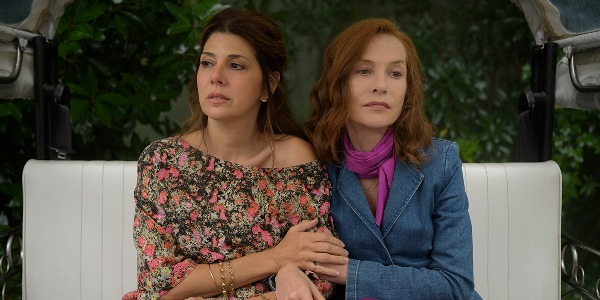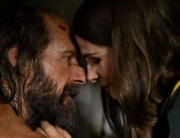As readers of the New York Times travel section may know, Portugal has been a hot destination for some time, although if its cities become overrun in the way of Florence or Dubrovnik, Croatia, blame can also go to director Ira Sachs’s Frankie. Besides the upcoming Downton Abbey movie, this may be the closest film in spirit to the Merchant-Ivory productions of the 1980s and ’90s—delicate dramas with rarefied characters and settings. However, the scenery here is not just part of the show, it’s the main event.
Isabelle Huppert stars as Françoise Crémont, aka Frankie to her friends, a renowned actress who is described by her second and current husband, Jimmy (a subdued Brendan Gleeson), as manipulative and determined, making her sound like a character out of Somerset Maugham or Nöel Coward. Yet instead of a meddler, Huppert plays Frankie as a cool observer, more withdrawn than introverted and calmly self-assured, as when she backs out of a family squabble, “I still haven’t had my coffee yet.”
Frankie has invited her extended family for a summer sojourn at the resort town of Sintra, not far from Lisbon, for some family time, though everyone has at least one dark cloud hovering over them. Oh, and she has so happened to have asked one of her closest friends, Ilene (Marisa Tomei), to come, in hopes that Ilene and her 30-something, shaggy blond son, Paul (Jérémie Renier), will hit it off.
Unbeknownst to her, Ilene has brought along her boyfriend, cinematographer Gary (Greg Kinnear), whose gosh-darned earnestness and directness contrasts with these more tightly-wound Europeans. The breezy Tomei and Kinnear bring a refreshing spontaneity to even the most expositional dialogue. Among this international cast, the American actors are the relaxed wide-eyed babes in the woods, taking in the surroundings as much as the viewers are.
Besides her son Paul, who is mooning over a breakup from two years ago, Frankie has also extended an invitation to Sylvia (Vinette Robinson), the daughter from Jimmy’s first marriage, as well as her husband, Ian (Ariyon Bakare), and their daughter, Maya (Sennia Nanua). Sylvia has been seeking her own flat back in London behind her husband’s back, and he has been asking their daughter for any intel. Also joining the party is Frankie’s first husband, Michel (Pascal Greggory), whose coming out of the closet shut down their marriage.
Throughout the 90-minute film, the marital problems of Sylvia and Ian, and even their personalities, come across as vague and more as plot filler. Robinson especially appears self-consciously tense no matter who she’s paired with. Meanwhile, this is Tomei’s film to steal; her Ilene is up for any new experience. Given that the screenplay tosses many balls in the air, the imploding relationship between Sylvia and Ian gets lost in the shuffle, while Michel wanders in and out, out of sight and out of mind.
The most affecting subplot involves teenager Maya, who takes off on her own one afternoon to get away from her feuding parents. On the bus to the nearby beach, a local boy her age, along with his pimply wingman, starts chatting her up, offering to guide her to the beach. When she and the local boy are alone together, the underage lothario takes her to the most scenic viewpoint overlooking the crescent-shaped beach, where Maya is, presumably, kissed for the first time. In this sequence, the film becomes intimate and observational, as in the best moments from Sach’s Little Men.
The majority of scenes are two-handers, with the actors often filmed standing side by side facing the camera, or wandering through the woods and the nearby tourist destinations, while the countryside provides a focus-pulling backdrop. Viewers can’t help but feel they are sitting in front of a proscenium stage. It’s a picture perfect setting for Gary to propose to Ilene, with the deep greens and dark shadows of the hazy verdant hills behind them—but viewers might have to divert their attention back to the actors. Huppert, though, makes her screen time feel less stage-bound; watch her subtly and physically move away from Gary as he pitches her his dream project for his directorial debut. She listens, but her body language, with arms crossed and posture slightly slouched, firmly indicates her answer: no.
There is only one scene with the family together, but no one behaves with a breezily, dismissive physical familiarity toward another. It’s as though they all have met for the first time. That’s another reason why viewers may be drawn away from the drama back to scenery.







Leave A Comment